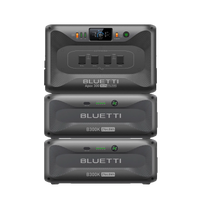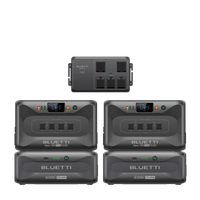Your cart is empty
Shop our products
If you have been considering installing a solar system as of late, there is no doubt you have come across the terms kW and kWh.
This is especially true if the solar system you are looking into is relatively large.
For smaller setups, such as solar generators, you have likely come across the terms W and Wh.
However, they are one in the same thing, which we will further discuss in this article.
Is kW and kWh the same?
In simple terms, the easiest way to understand the difference between the two is like this:
- A kW (kilowatt) is a measure of power.
- A kWh (kilowatt-hour) is a measure of energy.
To understand the difference between power and energy we have created an easy to understand analogy for both kW and kWh.

What is a kilowatt?
A watt is a unit of power. In the international system of Units, it is defined as a derived unit of 1 kg⋅m²⋅s⁻³ or, equivalently, 1 joule per second.
A kilowatt is equal to 1000 watts.
In essence, a watt measures the rate at which energy is transferred.
The watt is named after an 18th-century Scottish inventor, James Watt.
According to Wikipedia: "James Watt was a mechanical engineer and chemist who improved on Thomas Newcomen's 1712 Newcomen steam engine with his Watt steam engine in 1776."
What is a kilowatt hour?
A kWh is a unit of energy equal to one kW of power sustained for one hour and is commonly used as a measure of electrical energy.
So, using our water hose analogy once again. A kWh equals the amount of water that ends up in the bucket or, in reality, the amount of electricity that is generated.
A kWh can also be viewed in terms of consumption. For example, in 2021, the average American household consumed approximately 892 kWh per month.
Once again, kilowatt hour equates to 1000 watt hours.
How do you calculate kW vs kWh?
The calculation is quite simple. here is an example: 1 kW sustained for 5 hours equals 5 kWh.
In other words 5 kWh = 1 kW * 5 hours.
Here are some more examples below:
| Kilowatt | Usage Time | Kilowatt Hours |
| 5 kW | 5 hours | 25 kWh |
| 2 kW | 20 hours | 40 kWh |
| 7 kW | 6 hours | 42 kWh |
| 25 kW | 3 hours | 75 kWh |
| 1 kW | 3 hours | 3 kWh |
| 47 kW | 8 hours | 376 kWh |
Why kWh matters in your home?

At the end of the month, you should receive a utility bill that states the amount of kWh your home consumed for the month.
The reason kWh matters for your home is simple. You pay per kWh of electricity usage.
As of the time of writing, the average cost of electricity in the U.S. is 14.47 cents.
Therefore, if your home consumed 892 kWh of electricity last month, you will be expected to pay $129. (892 * 0.1447)
The idea is that you want to keep your home energy consumption to a minimum. Less consumption means less money spent each month.
It also means less Co2 emitted to supply your home with the electricity it needs.
Final thoughts
One way to completely eradicate your home's Co2 footprint and monthly utility bill would be by installing a rooftop solar system.
A rooftop photovoltaic system is measured by its power rating in watts (for smaller systems) and kW (for more extensive systems).
So you might ask, what size (kW) solar system do I need to offset my home's electricity consumption (kWh)?
There is a pretty easy formula you can use which should give you a rough estimate.

You should already know your homes monthly electric consumption. Simply take a look at your yearly utility bill and average out the amount you consume per month.
Then you will want to figure out your locations peak sun hours, you can do that by visiting websites such as Climatebiz or Global Solar Atlas.
Now let's put our formula into practise.
892 kWh / 156 peak sun hours = 5.71
5.71 is actually the size solar system you would need to offset your consumption in your location. So it would be 5.72 kW.
To figure out how many individual solar panels that would equate you can times that amount by 1000.
5.72 x 1000 = 5720 watts.
Now, what power rating is your proposed solar panels?
Most homes go with 400 watt solar panels.
5720 / 400 = 14 solar panels needed for a home that consumes 892 kWh of electricity each month.
We hope this article shed some more light on the benefits of understanding the difference between kW vs kWh.
If you have any questions, feel free to reach out!
Shop products from this article
Be the First to Know
You May Also Like

What Does a 30% Federal Solar Tax Credit Mean and How to Apply?
Governments around the world are offering programs that encourage homeowners to switch to solar energy. Among the most notable programs is the 30% Federal Solar Tax Credit. It reduces your...

Deadly Flooding Devastates U.S. South and Midwest — What You Need to Know

















































































































































































































































